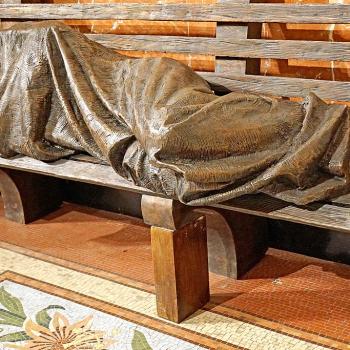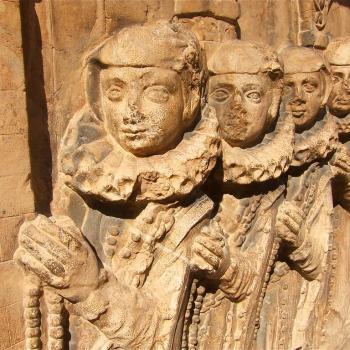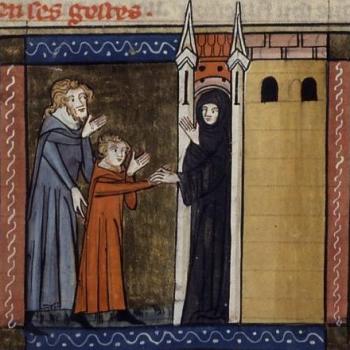
Every human person shares the same human nature with each other. This gives to each and every human person the same human dignity. No matter what anyone has done, they do not lose their humanity, nor, therefore, their human dignity. Basic human rights flow from that dignity, which is why those who try to find a reason to ignore those rights tend to do so by denying that dignity. This is how many Christians justify any and all abuse they give to their neighbor: their neighbor, in their sins, have lost their human dignity, and without that dignity, the requirement to love them is no longer in place.
Certainly, sin can corrupt the person who sins, but the corruption lies in their personal character, not their humanity. No matter what someone has done, no matter how much their own sin has hurt them and corrupted their character, that humanity remains the same. We are to honor them and show them care because humanity is itself a good which is to be respected. As everyone has that goodness in them, God loves everyone:
Not because He loved them more did He care for these; because He does not love the others less than them, since it is not the person He loves but <human> nature. And if it is the nature He loves, all persons are included within the boundaries of His love, good and bad. And if, without hesitation, while not hiding faults, He granted forgiveness to these whose great number of sins made them unrighteous, all the more reason He will make worthy those whose <sins> are less. [1]
If God loves everyone, despite their sins, because God sees the good in everyone, we, likewise should do the same. Who are we to reject those whom God loves? Who are we to deny them basic rights? This is why, when Jesus said we are to love our neighbors, he meant everyone, including and especially those we deem as our enemies; he did not want us to find excuses to deny our neighbor the love which we should give them:
You have heard that it was said, `You shall love your neighbor and hate your enemy.’ But I say to you, Love your enemies and pray for those who persecute you, so that you may be sons of your Father who is in heaven; for he makes his sun rise on the evil and on the good, and sends rain on the just and on the unjust. For if you love those who love you, what reward have you? Do not even the tax collectors do the same? (Matt. 5:43-46 RSV),
If God will not deny love, and with it, grace, even to the worst sinner, neither should we. This does not mean we should ignore all the evil someone has done. We must be concerned with justice, working to restore it when it is lost. But how we do so is important. We should be concerned about restorative justice, not retribution. We should look to help those who have been harmed by sin, which include the one who sins. We must engage an evil doer with love, dealing with them as a human person who has innate dignity and rights because of their humanity.
We are shown the general love God gives to humanity, indeed, to the whole of creation, by the incarnation, especially in and through the work done on the cross: God did not come to judge and condemn the world, but rather, to raise it up, revealing its inherent goodness. Indeed, God has shown such a great a love for creation, God has made a space for creation so that everyone in it can participate in the divine life for themselves:
The inner-reality of God as self-emptying and self-communicating love, which has become decisively and unsurpassably revealed in the cross, does not remain in itself, but it is bestowed on us concretely in the Holy Spirit. In his mercy, God lets us not only see into his heart; he creates space for us beside his heart and in his heart through the Holy Spirit. [2]
Christians must follow Christ’s example. We must love everyone, first and foremost, because of their inner goodness, a goodness which remains immutable:
Not to love or hate someone on account of his ways, but to love him for himself, beyond searching <his> ways, as God <does>. Indeed, ways may change but you, before someone of your nature remains immutable, in the image of God. Indeed, in the washing of regeneration, He has given you His likeness. Made incorruptible in the mystery, take care to have and incorruptible intelligence, according to the model you have received. [3]
We should engage everyone in such a way that we do not ignore their innate goodness, their innate human dignity, and the rights which flow from that dignity. This is how God acts towards us. If God acted any differently, no one could be saved, for if God sought to condemn the world instead of save it, who could be saved? But the way of condemnation is not the way of God. If we want to follow God’s way, we must not be judgmental but loving. In the end, it is only by love can we really get what we want, which is the end of evil and the restoration of the good which evil tries to destroy.
[1] St. Isaac the Syrian, “The Third Part.” Trans. Mary T. Hansbury in An Anthology of Syriac Writers From Qatar in the Seventh Century. Ed. Mario Kozah, Abdulrahim Abu-Husayn, Saif Shaeen Al-Murikhi and Haya Al Thani (Piscataway, NJ: Gorgias Press, 2015), 334-5 [VI.31].
[2] Walter Kasper, Mercy. Trans. William Madges (New York: Paulist Press, 2013), 94
[3] St. Isaac the Syrian, “The Third Part,” 318 [IV.26].
Stay in touch! Like A Little Bit of Nothing on Facebook.
If you liked what you read, please consider sharing it with your friends and family!
N.B.: While I read comments to moderate them, I rarely respond to them. If I don’t respond to your comment directly, don’t assume I am unthankful for it. I appreciate it. But I want readers to feel free to ask questions, and hopefully, dialogue with each other. I have shared what I wanted to say, though some responses will get a brief reply by me, or, if I find it interesting and something I can engage fully, as the foundation for another post. I have had many posts inspired or improved upon thanks to my readers.













